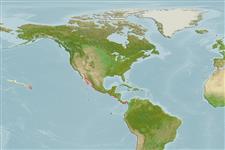Teleostei (teleosts) >
Eupercaria/misc (Various families in series Eupercaria) >
Haemulidae (Grunts) > Haemulinae
Etymology: Haemulon: Greek, haimaleos = bloody (Ref. 45335).
More on author: Gill.
Environment: milieu / climate zone / depth range / distribution range
Ecology
Marine; reef-associated; depth range 3 - 30 m (Ref. 5227), usually 10 - 12 m (Ref. 5227). Tropical; 28°N - 7°N
Eastern Central Pacific: Gulf of California to Panama.
Size / Weight / Age
Maturity: Lm ? range ? - ? cm
Max length : 71.0 cm TL male/unsexed; (Ref. 55763); common length : 30.0 cm TL male/unsexed; (Ref. 55763); max. published weight: 2.3 kg (Ref. 40926)
Body oblong, compressed and not very deep (depth contained 2.9 to 3.3 times in standard length ); mouth large and terminal, its posterior end located under the anterior rim of the eye; first gill arch with 18 to 22 gill rakers; dorsal fin notched, with 11 to 12 spines and 16 to 18 soft rays (XI-XII, 16-18); second anal spine slightly longer and stronger than third; scale series above lateral line oblique; juveniles with 3 vertical bars and a caudal spot that disappears with age; adults with 6 or 7 dark gray vertical bars on a yellowish body; head with a dark spot behind the eye (Ref. 55763).
Forms schools in coastal reefs during the day but disperses at night in search for food. Often feed by digging in sand (Ref. 5227).
Life cycle and mating behavior
Maturity | Reproduction | Spawning | Eggs | Fecundity | Larvae
Oviparous, distinct pairing during breeding (Ref. 205).
McKay, R.J. and M. Schneider, 1995. Haemulidae. Burros, corocoros, chulas, gallinazos, roncos. p. 1136-1173. In W. Fischer, F. Krupp, W. Schneider, C. Sommer, K.E. Carpenter and V. Niem (eds.) Guia FAO para Identification de Especies para lo Fines de la Pesca. Pacifico Centro-Oriental. 3 Vols. FAO, Rome. (Ref. 9114)
IUCN Red List Status (Ref. 130435: Version 2024-2)
Threat to humans
Harmless
Human uses
Fisheries: minor commercial
Tools
Special reports
Download XML
Internet sources
Estimates based on models
Preferred temperature (Ref.
123201): 22.9 - 29.1, mean 28 °C (based on 149 cells).
Phylogenetic diversity index (Ref.
82804): PD
50 = 0.5000 [Uniqueness, from 0.5 = low to 2.0 = high].
Bayesian length-weight: a=0.02512 (0.01502 - 0.04202), b=3.02 (2.88 - 3.16), in cm total length, based on LWR estimates for this species & Genus-body shape (Ref.
93245).
Trophic level (Ref.
69278): 4.2 ±0.73 se; based on food items.
Generation time: 8.3 ( na - na) years. Estimated as median ln(3)/K based on 1
growth studies.
Resilience (Ref.
120179): Low, minimum population doubling time 4.5 - 14 years (K=0.13).
Fishing Vulnerability (Ref.
59153): High vulnerability (58 of 100).
Nutrients (Ref.
124155): Calcium = 26.6 [9.7, 51.1] mg/100g; Iron = 0.52 [0.26, 0.95] mg/100g; Protein = 19.4 [17.5, 21.2] %; Omega3 = 0.118 [0.064, 0.199] g/100g; Selenium = 30.9 [16.3, 56.9] μg/100g; VitaminA = 121 [44, 318] μg/100g; Zinc = 0.879 [0.599, 1.285] mg/100g (wet weight);
